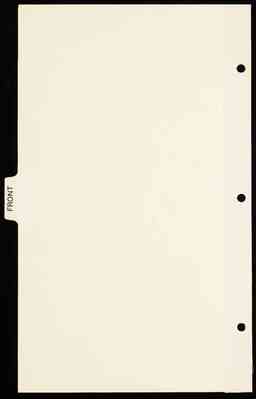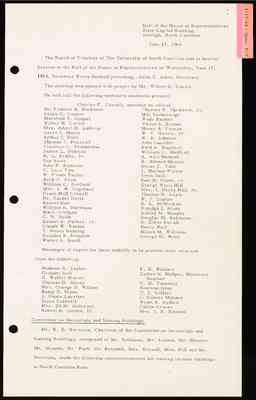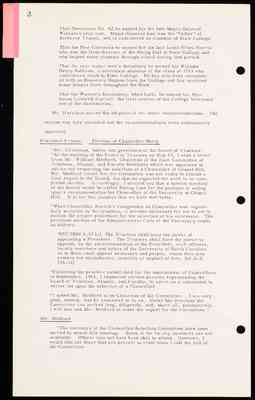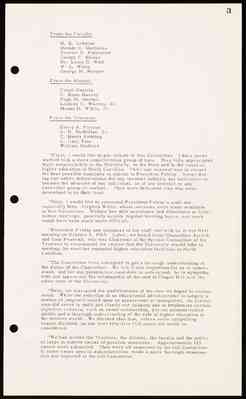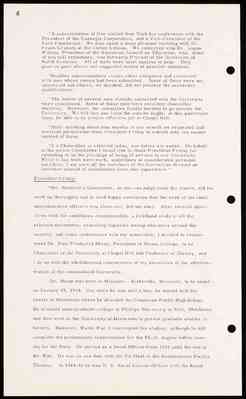Pages
FRONT
6/17/64 - Spec. B/T
1
Hall of the House of Representatives State Capitol Building Raleigh, North Carolina June 17, 1964
The Board of Trustees of The University of North Carolina met in Special Session in the Hall of the House of Representatives on Wednesday, June 17, 1964, Governor Terry Sanford presiding, Arch T. Allen, Secretary.
The meeting was opened with prayer by Mr. Wilbur H. Currie.
On roll call the following members answered present: Charles F. Carroll, member ex-officio Dr. Francis A. Buchanan Thomas B. Upchurch, Jr. Lenox G. Cooper Hill Yarborough Marshall Y. Cooper Wade Barber Wilbur H. Currie Victor S. Bryant Mrs. Albert H. Lathrop Henry A. Foscue Larry I. Moore W. C. Harris, Jr. Arthur 1. Park W. A. Johnson Thomas J. Pearsall John Lassiter Clarence L. Pemberton Reid A. Maynard James L. Pittman William C. Medford H. L. Riddle, Jr. A. Alex Shuford Roy Rowe B. Atwood Skinner John P. Stedman Oscar C. Vatz C. Lacy Tate J. Shelton Wicker W. Frank Taylor Irwin Belk Arch T. Allen Sam N. Clark, Jr. William C. Barfield George Watts Hill Mrs. J. W. Copeland Mrs. J. Henry Hill, Jr. Frank Hull Crowell Thomas H. Death Dr. Rachel Davis W. J. Lupton Robert Hall D. L. McMichael William B. Harrison Rudolph I. Mintz Mack Jernigan Ashley M. Murphy G. N. Noble Douglas M. Robinson Ernest E. Parker, Jr. R. Glenn Stovall Claude W. Rankin Henry Weil T. Henry Redding Macon M. Williams Evander S. Simpson George M. Wood Walter L. Smith
Messages of regret for their inability to be present were received from the following: Shahane R. Taylor Graham Bell R. Walker Martin Thomas O. Moore Mrs. George D. Wilson Kemp B. Nixon J. Hanes Lassiter Jesse Caldwell Mrs. Ed M. Anderson Robert B. Jordan, III F. E. Wallace Luther H. Hodges, Honorary Member C. M. Vanstory Bowman Gray T. J. Collier J. Gilmer Mebane Wyatt R. Aydlett Calvin Graves Mrs. J. B. Kittrell
Committee on Memorials and Naming Buildings
Mr. W. B. Harrison, Chairman of the Committee on Memorials and Naming Buildings, composed of Mr. Robinson, Mr. Lupton, Mr. Skinner, Mr. Murphy, Mr. Park, Dr. Swindell, Mrs. Kittrell, Mrs. Hill and Mr. Harrison, made the following recommendations for naming various buildings at North Carolina State:
2
That Dormitory No. 62 be named for the late Major General William Carey Lee. Major-General Lee was the "father" of Airborne Troops, and is considered an alumnus of State College.
That the New Cafeteria be named for the late Louis Hines Harris who was the first director of the dining hall at State College and who helped many students through school during that period.
That the next major men's dormitory be named for William Henry Sullivan, a prominent alumnus of the class of 1913 who contributed much to State College. He has also been recognized with an Honorary Degree from the College and has received many honors from throughout the State.
That the Women's Dormitory, when built, be named for Mrs. Susan Caldwell Carroll, the first matron of the College Infirmary and of the dormitories.
Mr. Harrison moved the adoption of the above recommendations. The motion was duly seconded and the recommendations were unanimously approved.
President Friday: Election of Chancellor Sharp
"Mr. Chairman, ladies and gentlemen of the Board of Trustees: "At the meeting of the Board of Trustees on May 25, I read a letter from Mr. William Medford, Chairman of the Joint Committee of Trustees, Alumni, and Faculty Members which was appointed to advise me respecting the selection of a Chancellor at Chapel Hill. Mr. Medford stated that his Committee was not ready to submit a final report to the Board, but that he expected the work to be completed shortly. Accordingly, I advised you that a special meeting of the Board would be called during June for the purpose of acting upon a recommendation for Chancellor of the University at Chapel Hill. It is for that purpose that we have met today.
"When Chancellor Aycock's resignation as Chancellor was regretfully accepted by the trustees, it became necessary for me to set in motion the proper procedure for the selection of his successor. The pertinent section of the Administrative Code of the University reads as follows:
'SECTION 2-10 (c) The Trustees shall have the power of appointing a President. The Trustees shall have the power to appoint, on the recommendation of the President, such officers, faculty members and tutors of the University of North Carolina as to them shall appear necessary and proper, whom they may remove for misbehavior, inability or neglect of duty. (cf. G.S. 116-12)'
"Following the practice established for the appointment of Chancellors in September, 1963, I requested certain persons representing the Board of Trustees, Alumni, and Faculty, to serve on a committee to advise me upon the selection of a Chancellor.
"I asked Mr. Medford to be Chairman of the Committee. I am very glad, indeed, that he consented to do so. Under his direction the Committee has worked long, diligently, and, above all, productively. I will now ask Mr. Medford to make the report for the Committee."
Mr. Medford
"The members of the Chancellor Selection Committee have been invited to attend this meeting. Some of the faculty members are not available. Others may not have been able to attend. However, I would like for those that are present to stand when I call the roll of the Committee:
From the Faculty:
H. E. .Lehman Donald R. Matthews Everett D. Palmatier Joseph C Sloane Dr. Louis G. Welt W. .L. Wiley George M. Harper
From the Alumni:
Frank Daniels C. Knox Massey Hugh M. Morton Lindsay C. Warren, Jr. Meade H. Willis, Jr.
From the Trustees:
Henry A. Foscue R. D. McMillan, Jr. T. Henry Redding C . L acy T ate William Medford
"First, I would like to pay tribute to this Committee. I have never worked with a more conscientious group of men. They fully appreciated their responsibility to the University, to the State and to the cause of higher education in North Carolina. Their one interest was to secure the best possible nominees to submit to President Friday. Never during our entire deliberations did any member indicate any inclination to become the advocate of any individual, or of any interest or any particular group or section. They were dedicated men who were detemined to do their best.
"Next, I would like to commend President Friday's staff and especially Mrs. Virginia Wells, whose services were made available to this Committee. Without her able assistance and attendance at Committee meetings, generally outside regular working hours, our work would have been much more difficult.
"President Friday and members of his staff met with us at our first meeting on October 5, 1963. Later, we heard from Chancellor Aycock and Tom Pearsall, who was Chairman of the Special Committee of the Trustees to recommend the course that the University should take in meeting the need for expanded higher education facilities in North Carolina.
"The Committee first attempted to get a thorough understanding of the duties of the Chancellor. We felt it was important for us to understand, and for any prospective candidate to understand, be in sympathy with and appreciate the relationship of the unit at Chapel Hill with the other units of the University.
"Next, we discussed the qualifications of the men we hoped to recommend. While the selection of an educational administrator is largely a matter of judgment based upon an assessment of intangibles, the discussion did serve to unify and clarify our thinking and to emphasize certain objective criteria, such as sound scholarship, proven administrative ability and a thorough understanding of the role of higher education in the modern world. We decided also that, unless some compelling reason dictated, no one over fifty-five (55) years old would be considered.
"We had invited the Trustees, the Alumni, the faculty and the public at large to submit names of possible nominees. Approximately 125 names were submitted. They were all examined by the full Committee. In some cases special subcommittees made a more thorough examination and reported to the full Committee.
4
"A subcommittee of five visited New York for conference with the President of the Carnegie Corporation, and a Vice-President of the Ford Foundation. We also spent a most pleasant morning with Dr. Frank Graham at the United Nations. We conferred with Dr. Logan Wilson, President of the American Council on Education, who, many of you will remember, was formerly Provost of the University of North Carolina. All of them were most anxious to help. They gave us good advice and suggested names of possible nominees.
"Smaller subcommittees visited other campuses and conferred with men whose names had been submitted. Some of these were not interested and others, we decided, did not possess the necessary qualifications.
"The names of several men already connected with the University were considered. Some of these men were excellent chancellor material. However, the committee finally decided to go outside the University. We felt that one from the outside might, at this particular time, be able to do a more effective job at Chapel Hill.
"After spending about nine months in our search we requested and received permission from President F riday to submit only two names instead of three.
"If a Chancellor is selected today, our duties are ended. On behalf of the entire Committee I would like to thank President Friday for extending to us the privilege of being of service to our University. While it has been hard work, sometimes at considerable personal sacrifice, I am sure all the members of the Committee derived an immense amount of satisfaction from this experience."
President Friday:
"Mr. Medford's Committee, as you can judge from the report, did its work so thoroughly and to such happy conclusion that the work of the chief administrative officers was clear-cut, but not easy. After several interviews with the candidates recommended, a firsthand study of all the relevant documents, searching inquiries among educators around the country, and many conferences with my associates, I decided to recommend Dr. Paul Frederick Sharp, President of Hiram College, to be Chancellor of the University at Chapel Hill and Professor of History, and I do so with the wholehearted concurrence of my associates in the administration of the consolidated University.
"Dr. Sharp was born in Missouri - Kirksville, Missouri, to be exact on January 19, 1918. But while he was still a boy, he moved with his family to Minnesota where he attended the Crookston Public High School. He attended undergraduate college at Phillips University at Enid, Oklahoma and then went to the University of Minnesota to pursue graduate studies in history. However, World War II interrupted his studies, although he did complete the preliminary requirements for the Ph.D. degree before leaving for the Navy. He served as a Naval Officer from 1942 until the end of the War. He was on sea duty with the 7th Fleet in the Southwestern Pacific Theatre. In 1944-45 he was U. S. Naval Liaison Officer with the Royal
